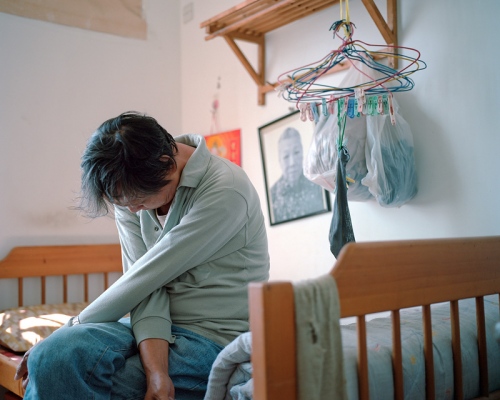
Sparse living Ng Yin-chow
Ng Yin-chow’s place is simple and compact. While Yin-chow has all the furniture he needs, the room is bare of any other personal items. He has lived here for seven years, but it seems like he could leave at any time.
Such simplicity probably comes from habit. Before Yin-chow moved into this place, he stayed in Castle Peak Hospital and intermittently in a halfway house for former mental patients. The year his mother died, he moved into this public housing unit in Hoi Lai Estate. The only decoration in the flat is a large black-and-white portrait of his mother, on the wall beside his bed. His mother was the person he respected and loved most.
Yin-chow is the eldest son. He has two sisters and a brother. But resentment is all he feels for two of his siblings. He was forced to drop out of school in Primary 2 to earn a living for the family by selling snacks in the streets. Every day, when Yin-chow returned home from work, his father would hit him with a bamboo stick.
Later, he found a job, but all the money he earned was spent on tuition fees for his siblings. However, when he was struggling to cope in later years, none of his siblings lent him a hand. “They didn't even inform me when they got married or when they had children,” Yin-chow says, sighing. “Forget it. They consider you family only when they can get a benefit from you. It’s OK. I don’t care.”
After moving into Hoi Lai Estate, Yin-chow has been relying on his monthly social welfare benefits to get by. In fact, his biggest wish is to get a job. However, as he has to take a day off to receive his injections every month, there would be no way to hide his sickness. That has frustrated him.
“A lot of people discriminate against people with mental illness,” Yin-chow says. He has repeatedly urged his doctor to let him take oral medication instead of having to return for regular injections. “He said, ‘You are already in your 60s, why bother getting a job?’” Yin-chow says. All he can do is accept that, he says reluctantly.
Every morning, Yin-chow sleeps until he wakes up naturally. Then he goes for a walk in the park or hangs out in the streets alone. He has become accustomed to living alone. He says he is not afraid of death or boredom. He occasionally dreams about his mother walking in the park with him.
“Your mum took very good care of you, right?” I ask. He folds his arms and sways slightly. His gaze seems to lose focus. After a long while, he replies softly, “Umm.”
Ng Yin-chow’s place is simple and compact. While Yin-chow has all the furniture he needs, the room is bare of any other personal items. He has lived here for seven years, but it seems like he could leave at any time.
Such simplicity probably comes from habit. Before Yin-chow moved into this place, he stayed in Castle Peak Hospital and intermittently in a halfway house for former mental patients. The year his mother died, he moved into this public housing unit in Hoi Lai Estate. The only decoration in the flat is a large black-and-white portrait of his mother, on the wall beside his bed. His mother was the person he respected and loved most.
Yin-chow is the eldest son. He has two sisters and a brother. But resentment is all he feels for two of his siblings. He was forced to drop out of school in Primary 2 to earn a living for the family by selling snacks in the streets. Every day, when Yin-chow returned home from work, his father would hit him with a bamboo stick.
Later, he found a job, but all the money he earned was spent on tuition fees for his siblings. However, when he was struggling to cope in later years, none of his siblings lent him a hand. “They didn't even inform me when they got married or when they had children,” Yin-chow says, sighing. “Forget it. They consider you family only when they can get a benefit from you. It’s OK. I don’t care.”
After moving into Hoi Lai Estate, Yin-chow has been relying on his monthly social welfare benefits to get by. In fact, his biggest wish is to get a job. However, as he has to take a day off to receive his injections every month, there would be no way to hide his sickness. That has frustrated him.
“A lot of people discriminate against people with mental illness,” Yin-chow says. He has repeatedly urged his doctor to let him take oral medication instead of having to return for regular injections. “He said, ‘You are already in your 60s, why bother getting a job?’” Yin-chow says. All he can do is accept that, he says reluctantly.
Every morning, Yin-chow sleeps until he wakes up naturally. Then he goes for a walk in the park or hangs out in the streets alone. He has become accustomed to living alone. He says he is not afraid of death or boredom. He occasionally dreams about his mother walking in the park with him.
“Your mum took very good care of you, right?” I ask. He folds his arms and sways slightly. His gaze seems to lose focus. After a long while, he replies softly, “Umm.”
伍賢就 - 孤客吟
伍賢就的家很簡潔,應有傢具齊備,卻怎都找不到一件多餘物品;他在這裡生活七年,卻彷彿是隨時都會離開的過客。這種簡潔大概出於習慣。伍賢就搬進來之前,斷斷續續住過青山醫院和精神病康復者的中途宿舍。母親過世那年,他獨個兒搬進了這個位於海麗邨的公屋單位。全屋唯一的裝飾,就是床邊白牆上亡母的巨型黑白肖像。母親,是伍賢就這輩子最敬重親愛的人。
伍賢就是家中長子,下有兩妹一弟,對於其中兩人,他只有怨恨。伍賢就從小二便被迫輟學到街邊賣涼果,回家卻只換來父親的「籐條炆豬肉」,後來出外工作,賺來的錢都用作供弟妹上學,惟他後來生活拮据時,弟妹並未施予援手。「結婚都唔同我講,有兩個仔女都唔同我講。唉都算數喇,啱就有親,唔啱就無親,算數喇。」
每月靠綜援過活,但其實他最大願望是得到一份工作。然而每月一天請假打針,勢令別人得悉他曾患病。「好多人歧視精神病架﹗」他多次央求醫生讓他吃藥不打針。「佢話六十幾歲仲做咩吖﹗」他惟有無奈接受。
如是者,伍賢就每天早上自然醒,便隨便挑個公園「出走」,又或獨個兒在街道間穿梭閒晃。他早已習慣了一個人,他說自己不怕死,不怕悶,只是偶爾會夢見老媽子陪他逛公園。
「媽媽對你很好吧?」他環抱雙臂開始輕輕搖晃,雙眼無焦點望着白牆,良久,他才輕輕哼了一下「嗯。」
返回相片
伍賢就的家很簡潔,應有傢具齊備,卻怎都找不到一件多餘物品;他在這裡生活七年,卻彷彿是隨時都會離開的過客。這種簡潔大概出於習慣。伍賢就搬進來之前,斷斷續續住過青山醫院和精神病康復者的中途宿舍。母親過世那年,他獨個兒搬進了這個位於海麗邨的公屋單位。全屋唯一的裝飾,就是床邊白牆上亡母的巨型黑白肖像。母親,是伍賢就這輩子最敬重親愛的人。
伍賢就是家中長子,下有兩妹一弟,對於其中兩人,他只有怨恨。伍賢就從小二便被迫輟學到街邊賣涼果,回家卻只換來父親的「籐條炆豬肉」,後來出外工作,賺來的錢都用作供弟妹上學,惟他後來生活拮据時,弟妹並未施予援手。「結婚都唔同我講,有兩個仔女都唔同我講。唉都算數喇,啱就有親,唔啱就無親,算數喇。」
每月靠綜援過活,但其實他最大願望是得到一份工作。然而每月一天請假打針,勢令別人得悉他曾患病。「好多人歧視精神病架﹗」他多次央求醫生讓他吃藥不打針。「佢話六十幾歲仲做咩吖﹗」他惟有無奈接受。
如是者,伍賢就每天早上自然醒,便隨便挑個公園「出走」,又或獨個兒在街道間穿梭閒晃。他早已習慣了一個人,他說自己不怕死,不怕悶,只是偶爾會夢見老媽子陪他逛公園。
「媽媽對你很好吧?」他環抱雙臂開始輕輕搖晃,雙眼無焦點望着白牆,良久,他才輕輕哼了一下「嗯。」